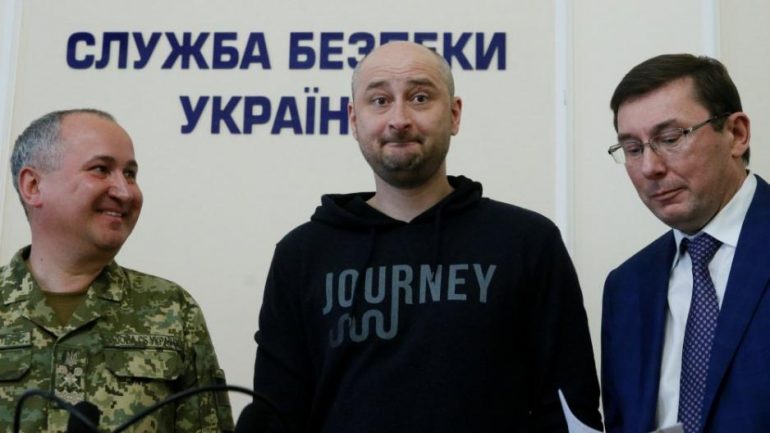Ukraine announced on Friday that the controversial assassination attempt on Russian journalist Arkady Babchenko had prompted the release of a list of 47 names, mostly journalists, who have been identified as targets for possible assassinations by Russia.
In a Facebook post, Ukraine's Attorney General Yuri Lutsenko said the operation had allowed security services to identify the list, which consists mainly of Ukrainian and Russian journalists, who "may be the next victims of terrorism."
Lutsenko clarified that all 47 people have been informed, while measures have been taken to protect them.
Russian journalist Matvey Ganapolsky, who has lived in Kiev since 2015 and has been granted Ukrainian citizenship, told Echo radio station in Moscow, where he works, that he had been summoned by Ukrainian security services and informed of the danger to his life.
He clarified that he had received new information about the threats against Babchenko, which, according to him, prove that "the case is very serious. "An attack was planned and they were preparing to kill him."
Ukrainian authorities had earlier said that Russia's secret service, which they accused of plotting to assassinate Babchenko, had planned to kill about 30 people.
On Friday afternoon, about ten G7 diplomats (Germany, Canada, USA, France, Britain, Italy and Japan) in Kiev went to the Attorney General's Office for a closed-door meeting.
The meeting was announced on Thursday by the Attorney General, who had stated on television that he wanted to "explain everything that can be explained with respect to the confidentiality of the investigation."
In a statement, the prosecutor's office stressed that "only the strategy chosen would allow not only to prevent the murder of the journalist, to prevent the commission of a crime, to record the actions of the organizer and to collect evidence (…) but also to collect information that concern potential victims against whom terrorist acts and homicides may have been planned. "
A senior European diplomat who attended the meeting said Lutsenko had given a convincing explanation to justify Ukraine's decision to direct Babchenko's assassination.
"I am satisfied, others are more satisfied than before. "I would say it was the right thing to do," the diplomat told Reuters, adding that Lutsenko "admitted that he was surprised by the media reaction and that it should have been treated better."
Also present at the meeting was Vassily Gritsak, head of the Ukrainian security services (SBU), which organized the "special operation".
Babchenko's assassination sparked widespread criticism, especially from journalists, who questioned the need for such extreme measures, as well as Kiev's accusations against Moscow.
Berlin, for its part, called for "a light to be shed on an event that for many is incomprehensible in the context of the rule of law."
A senior European official has suggested that the Babchenko case could undermine Kiev's credibility if the Ukrainian government does not immediately provide evidence of an alleged Russian conspiracy.
An important date for this will be July 9, when the EU-Ukraine summit will be held in Brussels, during which Ukrainian President Petro Poroshenko will have to bring evidence, if he has not done so earlier, the official added.
